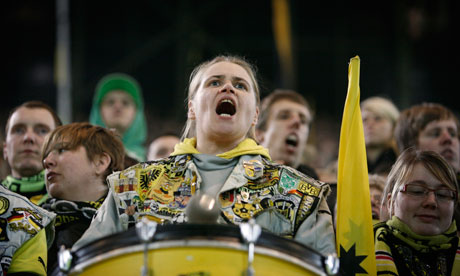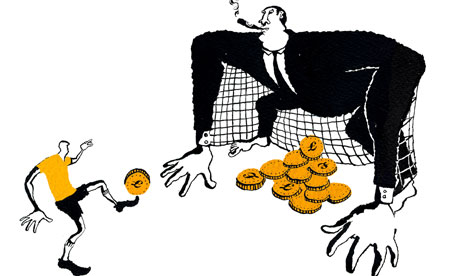Premier Foods, one of the UK's biggest manufacturers, has been asking its suppliers for payments to continue doing business with the firm.
One supplier said the practice - known as pay and stay - was like "blackmail".
Newsnight understands the struggling company has received millions of pounds from its suppliers in this way.
Premier Foods said it was confident the scheme did not break any rules under competition law. The government said it was "concerned by recent reports".
The company, which owns brands like Mr Kipling, Ambrosia, Bisto and Oxo, demanded the payments from suppliers across the country.
Newsnight has seen a letter sent by chief executive Gavin Darby, dated 18 November.
'Nominated for de-list'
He wrote: "We are aiming to work with a smaller number of strategic suppliers in the future that can better support and invest in our growth ideas."
He added: "We will now require you to make an investment payment to support our growth.
"I understand that this approach may lead to some questions.
"However, it is important that we take the right steps now to support our future growth."
But when a supplier raised questions in an email about the annual payments, another member of Premier's staff replied.
"We are looking to obtain an investment payment from our entire supply base and unfortunately those who do not participate will be nominated for de-list."
One of the company's more than 1,000 suppliers, Bob Horsley, said he had been "taken aback" to receive the letter.
Scared to speak out
Mr Horsley, who has had a maintenance contract with Ambrosia in Devon for more than 10 years, said: "I think it's like blackmail.
"What they are saying is 'unless you pay this money, you can't do the work'."
He has decided not to pay and risk losing the contract.
"I'm just a layman but I can't see how that is right."
Another businessman said Premier had previously asked for more than £70,000.
"They know you can't afford solicitors to fight them. I'd never pay anyone for work."
Another said: "It's like a gun held to your head."
Many businesses are scared to speak out for fear of losing their contracts.
'Unjust'
Premier Foods has reduced its number of suppliers dramatically in the last 12 months.
In 2013 it made a similar approach to some of its suppliers.
The practice of pay to stay is not unheard of in manufacturing and retail.
After a competition inquiry, tighter rules were issued for the supermarkets under the Groceries' Code.
But that applies to the relationship between supermarkets and suppliers, not manufacturers.
Liesl Smith, from the Federation of Small Businesses, said: "This is the first time that we have ever seen anything so blatant... in this very direct way before.
"We think it is unjust, it is not competitive and it is not helping the supply chain.
"Premier Foods certainly don't value their suppliers, it's crippling small businesses.
"It's not just going to affect the business owners, it will affect staff as well."
'Support crucial'
Premier Foods told Newsnight: "We launched our 'invest for growth' programme in July last year as part of a broader initiative to reduce complexity in support of plans to help turnaround the business.
"This included a commitment to halve the number of our suppliers and develop more strategic partnerships focused on mutual growth.
"The programme requires our suppliers to make an annual investment to help fund our growth plans.
"In return, our suppliers benefit from opportunities to secure a larger slice of our current business.
"They also stand to gain as our business grows in the future."
It added: "In the current challenging environment, the support of all of our suppliers is crucial.
"We have had a positive response from many who are actively engaging in building a new partnership with us, including many small companies."
Newsnight understands many suppliers have paid a total in the low millions so far.
Competition law states that in some cases, pay to stay can be against the law.
Premier Foods is confident its scheme is within the rules.
Labour bid
But concerns about the wider problem have been raised with the regulator, the Competition and Markets Authority, and this week with the government.
Labour tried to amend the law recently to make the practice explicitly illegal.
Toby Perkins, the shadow business minister, said: "Labour pushed to outlaw companies charging to stay on their supplier list.
"But, alongside steps to prevent customer late payment, they were rejected by the government.
"Building a stronger economy relies on free and fair markets, but where unfair practices emerge, government should be willing to take action as today's revelations appear to expose."
A spokesperson for the Department of Business Innovation and Skills said it was a "hugely important issue" that ministers were taking "very seriously".
"We are concerned by recent reports, and are consulting to assess the evidence so we can establish what more we can do.
"We are also consulting on whether the biggest companies should be required to report publically on whether businesses need to pay to be on their supplier lists."
Newsnight understands that the regulator, the Competition and Markets Authority, is reluctant to commit resources to an investigation unless more businesses are willing to come forward.



